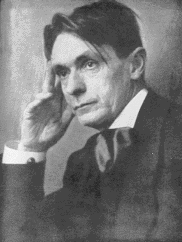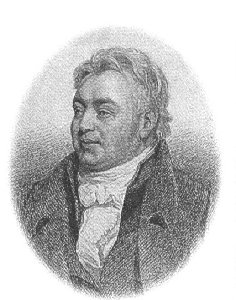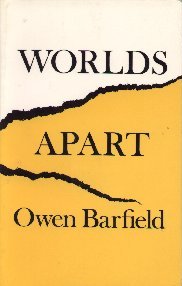
Steiner

Goethe

Coleridge
| Objective Idealism |
The modern epistemological outlook, Barfield contends, "is really a very strange marriage of ideas indeed . . . and has led to all sorts of matrimonial jars, all sorts of difficulties, all sorts of uneasy metaphysical arguments about what (if anything) is actually there outside of us and what is not really there, but is only a kind of appearance, or deception. All sorts of lyrical backchat about Juniper trees when there is no one about in the Quad" (RCA 227).2 Barfield's thought strives to avoid these absurdities.
Barfield takes pains to point out that, unlike a hardcore idealist, he is not about to argue that "the solid globe is as insubstantial as a rainbow" (SA 22-23). Rather, objective idealism teaches that, according to "Steiner's insistence--and Goethe's before him--. . . the Thinking on which our experience of nature depends, really is in--objectively in--nature . . ." (RCA 227).
Objective idealism is so counter-intuitive that general acceptance of its truth will not come easily. As Barfield explains in What Coleridge Thought,
By doing so, we become ready to see the truth of objective idealism:Although the outness of phenomena is a law of our nature, we are not conscious of it as a law. We are merely conscious of their outness. The first prejudice may properly be called a "prejudice" because it dissolves upon analysis. It ceases to be a prejudice only when we become conscious of it as a law; when we transcend it, not by a sophisticated and unreal realism of appearances-of-things versus things themselves, but that actual realism, which understands and accepts the law.
we become aware that reality, although it is indeed real, is also appearance; and that appearance, although it is indeed appearance, is also reality. We emerge from what was essentially a sleeping relation with phenomena into a waking one; and it was this awakening, into which, paradoxically, the unhappy opium addict [Coleridge] was mainly concerned to arouse his contemporaries and posterity, confident, that, once that has been effected, the fact that nature is essentially one with the intelligence in us, will no longer seem a wild and incredible speculation, or a pathetic fallacy, but will become a self-evident fact. (66)
Donna Potts analyzes the influence of objective idealism on the American poet Howard Nemerov in a monograph available in its entirety here.
| See in particular "Man, Thought, and Nature" (RCA 223-240). |
1In an interview
with Shirley Sugerman, Barfield offers, by way of contrast, the following
brief history of subjective idealism.
|
2Barfield appears
to be referring to a famous philosophical limerick by Ronald Knox.
Must think it exceedingly odd if he finds that this tree continues to be When there's no one about in the quad." Dear Sir:
Will continue to be, Since observed by Yours faithfully GOD. |
